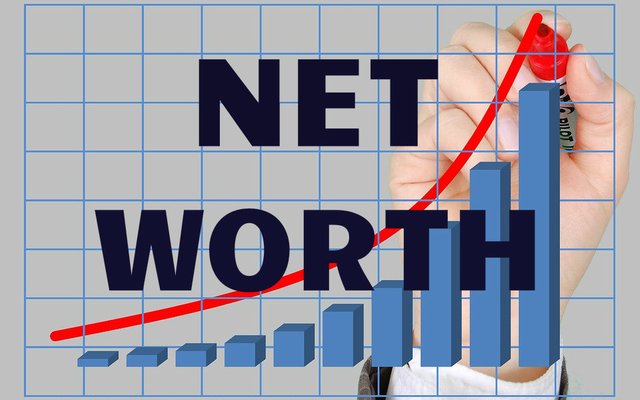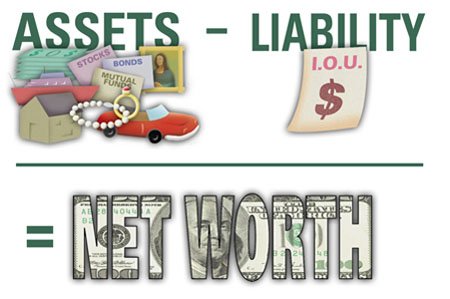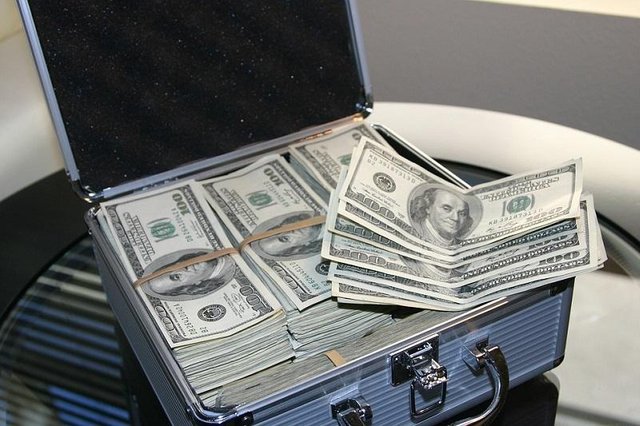Why Tracking Your Net Worth Is A Great Motivator To Become Wealthy

I’ve been tracking my net worth since the end of November of 2014. I started because I became married the month prior. We also found out that my wife was pregnant (Yeah, we wasted no time!). It was time to get serious about the future as I was no longer responsible for just myself.
So I began to budget, and also added up all my assets and liabilities. That is all net worth is – your assets minus your liabilities (debts).
I found out that my net worth was just over $80k.
It was sobering. I mean that it wasn’t horrible, but I had made hundreds of thousands of dollars over my working years and all I have left was a fraction of it. I had been so wasteful with the money I had been given for putting up with everything that I had to do at work.
In my adult life I have only worked for the same employer since age 17. In 2014 I had turned 33, so roughly 16 years. Most of those years I worked way more than 40 hours per week I currently do, so let’s say 2300 hours a year. That comes out to 36,800 hours worked, or a whole $2.17 an hour that I managed to keep.
Some of that was used to pay for basic necessities, some had been spent on useful things, but most had been wasted with no lasting benefit.
I vowed right then and there to do better.
I began to read personal finance blogs. budgetsaresexy.com - mrmoneymustache.com and the forums there – dividendmantra.com before it was sold – and various other personal finance websites.
The only thing was that most of the people in the personal finance blogging niche are highly paid professionals. Many are engineers, programmers, and similarly high income folks. The only exception was Jason from Dividend Mantra who worked at a car dealership. I'm paid a decent wage, but nowhere near six-figures.
I didn’t let that stop me though, as Robert Kiyosaki says "it's not what you make, it's what you keep."
I read books.
I watched videos on Youtube that gave me financial knowledge.
I started to work multiple side hustles to bring in extra cash.
I paid off all my debts up to the mortgage.
In short, I got serious about keeping and building wealth.
Now, just two years later my net worth has increased to $173k! It has more than doubled in the last two years! During 16 working years I only managed to accumulate a positive $80k in assets because of not tracking my net worth. In two years of tracking however, I gained a positive $93k. THAT is the power of making something your focus.

How To Find Your Net Worth
The other lists all your loans or other debts. This means your mortgage, car loan, student loan, credit card balance or anything else you owe money for. These are liabilities.
Subtract your liabilities from your assets and you have your net worth. Some people might find that they have a negative number, maybe they recently graduated from university and haven't had many years of earnings yet. While it might be humbling to find out that a homeless person is currently ‘worth’ more than you, I would say there is a good chance that since you are reading this that you are in a better position to add to your number.

Why Net Worth Matters
Some people make fantastic six-figure incomes and live paycheck-to-paycheck. Income can be a fickle beast though, and disappear with hardly any time to adjust. You net worth is how much money you would have leftover if you sold everything you own and paid off every one you owe.
If you have a net worth of $100k and you live off of $25k, then in a worst case scenario you could live for 4 years without any income. This provides you with financial security. Yes, it would be a huge change in your life to sell all of your assets, but just knowing that you have years ‘saved’ up is a huge pile of stress off your back.
Those high income people living paycheck-to-paycheck have hardly anything saved and are accustomed to living an expensive life. If anything happened to their income, say they lose their job in a bad economy and no one is hiring or a medical problem appears, what would those people do?
Some people focus on increasing their income just so they can ‘afford’ the finer things in life. I focus on my side hustles for income so that I can increase my investments and thereby my net worth. It is these investments that will (hopefully) grow and allow me to live off of their ‘fruits’ in the future.

Start Tracking Today
Competition is just a part of human nature. When many people think about the word, it is viewed as a conflict of sorts but it doesn't have to be. There is such a thing as beneficial or friendly competition. Think about a company having two departments compete against each other to make the most sales. Imagine an athlete striving to beat their personal best.
In the personal finance world you often hear about "keeping up with the Joneses" or FOMO the "fear of missing out." This is a natural reaction to be similar to your peers. To be accepted as part of your local tribe. The problem is that so many people are barely making ends meet, that to try to be the same as them is financial folly. I put aside these types of thoughts. I know what I am doing will help me more than any purchase made for appearance sake.
Your net worth is a result of your past financial behavior. To increase it is to just compete against yourself. I view this as a positive action towards self-improvement.
Start tracking. Compete against yourself in a positive manner. Become financially secure and then become wealthy as your investments grow faster and faster. It will take years and maybe decades, but it is within yourself to do it. Think about the positive aspects of a future where you never have to worry about money.
Because even if you fall short, you will be in a better position than you would have otherwise been.
Pictures from Pixabay or 1
My website: DoublingDollars.com
I gotta agree with you here. It's like they say, "What gets measured gets managed."
It's too bad people keep their finances so secret - I understand the reasons, but having a little friendly competition (ideally w/ some friends in similar financial boats, or with online friends) can really be the fire that pushes you forward. And you can't share the info without first knowing what it is.
Being on Steemit was the catalyst to starting my own personal finance blog. I wanted to be part of that group that shares financial ideas and challenges each person to be better than the previous year.
I like your post. I believe tracking is the best way knowing when money goes, it quite surprising to see where money is slipping through our fingers. Good advice!!
Money is very important to our lives yet so many don't seek financial knowledge. Having no money problems is a part of freedom. Having debt means you are an indentured servant until it gets paid off.
I don't know about you, but I would rather be free.
Freedom is everything. Owing money is bondage.
Great post! Fully agree with your post. Even so, when not only tracking net worth but also bit more details what you spend on various categories, it is much easier to not overspend and also it'll give you insights into where a lot of money is wasted, hence where you can save money. More money saved means more money to invest. Invest in long term things, like pension, saving account, but also in little more risky but also more rewarding investments like crowd funding (don't just invest in anything that sounds nice but really research the company; go for loans which are converted into equity at some point; preferably those loans for which tou can choice to be turned into equity to allow you to convert those loans for which equity makes sense and profits in the longer run).
Yea! My post before this one was about 'budgeting' https://steemit.com/money/@getonthetrain/how-to-budget-a-step-by-step-guide-to-create-a-financial-plan-and-become-debt-free
I consider the day to day stuff separate, but related. They do go hand in hand, but one is small scale and the other large.
I love this! I'm 24, And I've been investing smaller amounts of money for a while now. I've been gradually starting to look at my net worth. I love this post.
Starting so young is a HUGE thing! I had the best of intentions when I was younger, but fell off the path along the way. While I didn't go too far into debt (always hated it), I saved basically nothing.
Your 20's can be an expensive time, but it is also the best time to invest due to the compounding effect. Still, knowing what to do and actually doing it are two different things. Glad to see you are doing it though! That extra 10 years you got on me will double your money in the end, since your investments should at least double over that time frame at 7%.
Again, you just keep on knocking it out of the park. I did the analysis you recommended and realised I'm stuck at two extremes. Whether that's a good or a bad thing, maybe we can discuss later...
Thank you for the great article, my brother! :)
Anytime, just let me know :D
Having a family indeed demands a control of the budget. Responsibilities... :D
That it does. But so worth it in the end. :D
haha... i don't know. everytime i see i'm not having a few million bucks, i get a bit depress.
That's why tracking works though. You can see the progress you are making and by watching it you can stay focused - if that is a goal of yours. Money for the sake of money isn't a good thing, IMO. I want money to be secure and to not have to work, to live off my investment income. I will have a decent pension if I can do two more years at my current job, but I would like another source as well.
Yes, agreed. Try to get some passive income.
Your house is not an asset. Or more specifically, your house is not your asset.
Your house is your largest liability. It takes money out of your pocket every month. And yes, it may be the best money you spent that month, but it is still an outflow, not an income.
Assets put money in your pocket; Liabilities take money out of your pocket.
Yes, I have read these things before in a past life. I no longer worry about things I can't control. I have to pay tribute to the goverment - nothing I can do about that. Banks own everything, including politicians - nothing I can do about that.
I heard they have all these shadow homes too, been hearing that for ages - not too many homes that are vacant around me. It seems that they are just waiting and waiting I guess. Sure some companies sprung up and bought single family homes to rent out, it was profitable.
Saving money is better than earning an equivalent amount because the government tribute that is taxes. My mortgage is 2/3rds of a what I would have to pay if I rented it. Not to mention the part of the payment that goes towards the payoff. I bought it in 2014 for $98k, the house next door to me sold this past summer for $170k with a smaller sq ft but has a pool. So currently that is a paper gain of about $30k or so a year.
A kilo gold bar that you pay to have stored and guarded - is that an asset or a liability? It doesn't put money in your pocket and it costs you to have it housed so I guess that is a liability.
I read the financial gurus too, doesn't mean they are correct or that I follow every word. They say things I agree with.